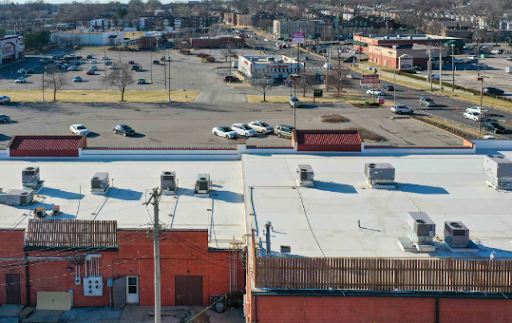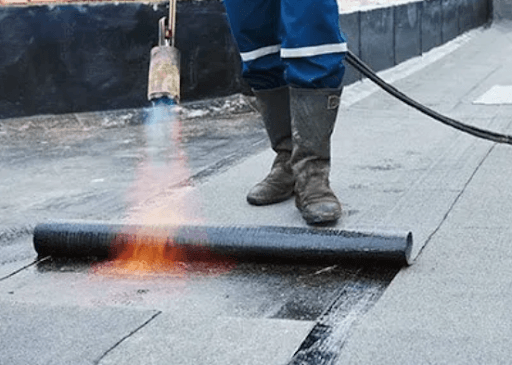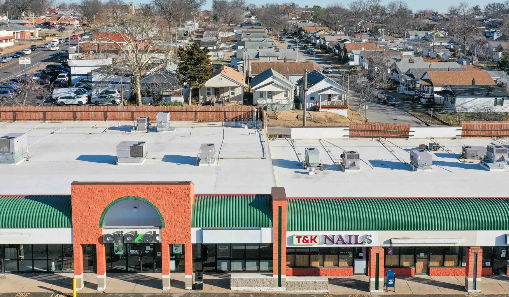
Flat roofs are one of the most durable and affordable products on the market. Most flat roofs can withstand dangerous winter weather and summer storm damage. They can last over ten years with the proper materials and the best installation team. Our commercial roofing team offers expert advice on commercial flat roofing below.
What Is a Flat Roof System?
This type of roofing is ideal for property owners or managers who have a tight budget or are worried about the cost of roofing installation. The cost and installation of a flat roof are significantly less than metal, wood, or asphalt shingle roofs. In addition, the materials and labor are cheaper, and the installation itself is inherently less risky than other methods.
The Benefits and Disadvantages of Flat Roofing Systems
Flat roofs are quicker and easier to install than traditional pitched (sloped) commercial roofs. The installation is less complex and far less disruptive, and you can utilize outdoor rooftop space on your commercial building/
However, flat roofing is less effective at draining water, snow, and ice away from the building's exterior. They're less energy efficient than other commercial roofing types and take regular maintenance checks to ensure they're damage-free.

Commercial Flat Roof Maintenance Tips
Heavy rain, ice, and snow all affect your roof and gutters. Not only does this weather expose your roof to more damage, but it can also leave environmental debris in your building's gutters and downspouts. Make it a habit of having your property or facilities manager clean off the roof and clear out the water drainage system.
Remember that roof leaks don't always happen as you see in cartoons. Often it's much more subtle, like a stain or discoloration on the ceiling of the top floor of your home. If you're noticing signs of water damage, there's likely already an active leak somewhere that needs to be dealt with ASAP. Even if you don't see any signs of apparent damage, it's always a bright idea to call in professionals for a roof inspection. Don't try to tackle this task on your own; it's best left to experienced roofing contractors.
Depending on what the experts find, your final written inspection document may include repairs with an outlined scope of work and an estimation of costs. The most common damage we see after a storm in the Midwest is from hail, particularly on roof slopes facing the direction from which hailstones fell, exposing "fresh" looking shingle substrate. Storm damage will usually occur on different roof slopes in different ways.
If you do need repairs or replacement, hiring the right roofing team for the job can mean the difference between a long-lasting roof and one that requires premature replacement. Our highly skilled roofers are experts at repairing storm and hail damage to keep your roof in top condition.

Choosing a Commercial Flat Roofing Contractor
Choosing the right roofing material for your commercial facility can help avoid unexpected maintenance costs and premature roof replacement. Also, the materials used must be top-quality to extend the life of your home's roof.
Understanding what to ask your roofing contractor during the vetting process will help you narrow down your options and highlight any red flags that the contractor doesn't have the experience to get the job done right.
Start by contacting a few roofing contractors in the Greater St. Louis area, and keep this checklist of questions handy as you speak more with them. Compare these answers to hone in on your final choice – but remember that the cheapest estimate is not always the best.
Work With CD Strong
CD Strong's industry expertise translates into a better roof over your building and a sound investment for your business. We utilize the most current industry practices and technologies to give you the strongest possible flat commercial roofing system —and one that will protect your business from the elements for years to come. We are a dependable commercial roofing contractor that can work with various materials on a wide array of projects.
Contact us today to learn more!
Are you searching for the best roof repair & roof installers in the Midwest?
CD Strong your trusted roofing contractor

CD Strong Construction – License #104015053 – Your Trusted Roofing Contractor


